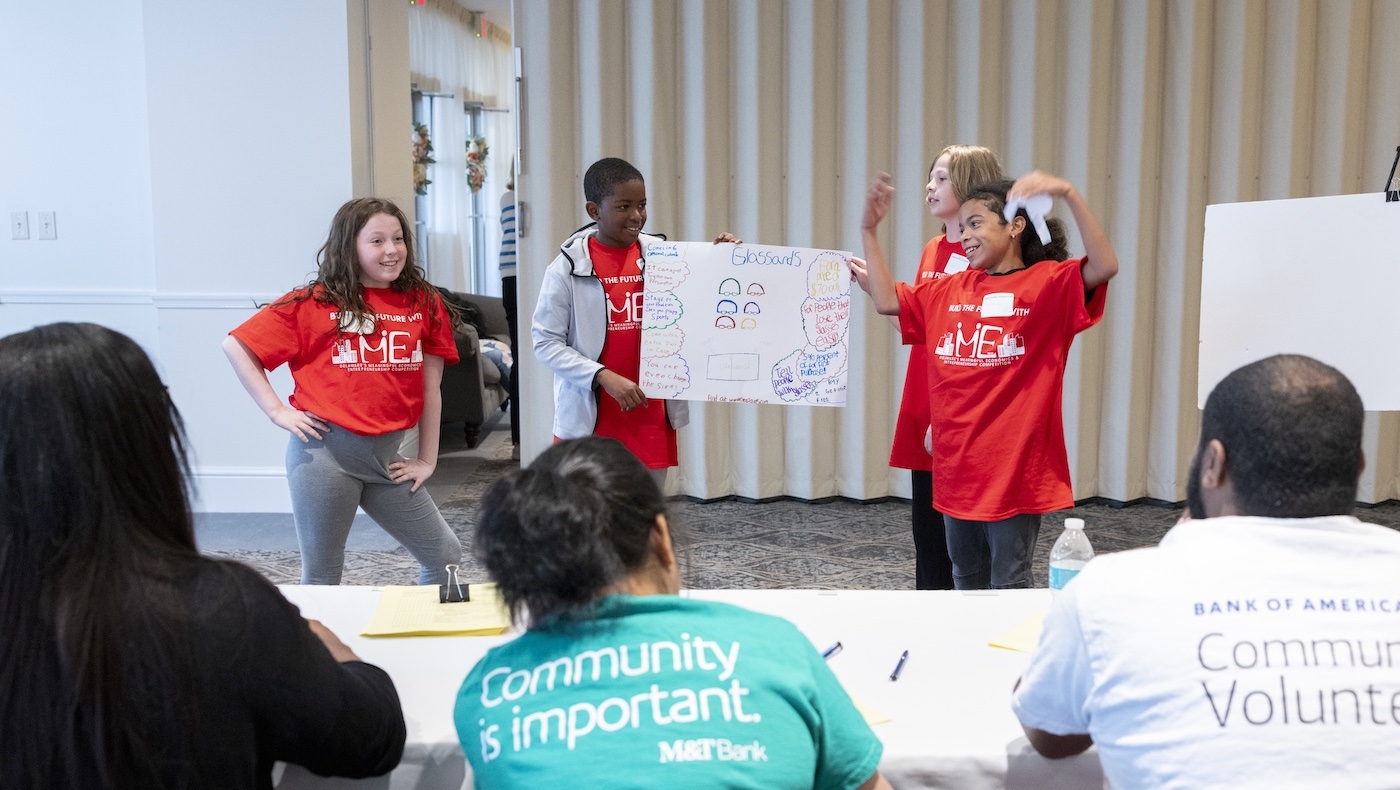This article was written by Cori Burcham.
This spring, Team 504 – a group of fifth graders from Newark’s Brookside Elementary School – entered a pin-drop quiet conference room to present their business idea at the 2025 Meaningful Economics (ME) Competition, hosted by the University of Delaware’s Center for Economic Education and Entrepreneurship (CEEE).
Standing before a panel of judges, Team 504 delivered their sales pitch with confidence and enthusiasm.
“Do you have knotty hair? Well, we have a solution for you! The Knot Brush.
“The Knot Brush has built-in detangling spray to save you from those hassles. [It] has two buttons, one that releases the detangling spray and one to get all that pesky hair.”
Now in its 37th year, the four-day ME Competition welcomed third- through fifth-grade students across Delaware to compete in hands-on economic challenges that exercise their creativity, build confidence and encourage collaboration.
For their final activity, a problem-solving challenge, 33 teams of fifth graders had to invent a new product that combines two existing goods, create a portmanteau – a creative name that combines two words – and develop a marketing strategy to pitch to the judges, much like a mock episode of ABC’s Shark Tank.
“So, Sharks, are you ready to eliminate those knots?” said a student in closing, fully committed to the scenario like a real contestant standing before investors rather than a friendly panel of supportive volunteers.
Nearly 400 students from 20 different Delaware primary schools experienced economics in action through three economics and personal finance challenges. In addition to the fifth-graders’ final challenge, third-graders repurposed Silly Putty, and fourth-graders designed stamps to reignite interest in the postal system.
For many returning students and teachers, this competition has become a beloved tradition that not only gives students a chance to apply economics knowledge from the classroom but also acts as a supplemental resource for teachers.
“The ME Competition is a great complement to what is taught in the classroom, especially when it comes to teamwork and collaboration,” said Moira Snider, a teacher at Maclary Elementary and Brookside Elementary School in Newark who accompanied Team 504.
“While students are learning economic concepts like opportunity cost, decision-making and entrepreneurship during class, the competition gives them a chance to apply those ideas in a team setting.”
The day of hands-on economic learning began with a group exercise challenging students to assemble 10 sets of “Kindness Kards.” Each card included original artwork and uplifting quotes to brighten someone’s day. The cards were distributed to educators after the event to spread positive messages to students and teachers throughout the state.
Student teams were provided with instructions, supplies, and 30 minutes to produce the sets. Team 503 – the second group from Brookside Elementary – came in first for the challenge.
Krzyzanowski noted that the activity teaches the value of efficiency and teamwork.
“Sometimes you have teams where one person grabs everything and starts dominating, but the teams that tend to do the best are the ones that approach it a little bit more patiently — they look through everything, collaborate, talk together and come up with a system,” said Krzyzanowski.
The day’s activities continued with a familiar challenge for the students, a written test that reviews economics fundamentals taught throughout lower and middle school as specified by Delaware’s academic standards.
The test was unique in that the format gave the pupils a chance to put their coordination and social skills into practice, a challenge Team 528 from West Park Place (WPP) Elementary rose to meet due to their careful preparation.
“Our teams practice taking the test together, with one leader reading the test questions aloud and a recorder jotting down the answers. We discuss the importance of making sure there are no arguments, focusing on productive debates if there is a disagreement regarding a correct answer,” said WPP teacher Tammy Hanby. Hanby noted that “it’s her students’ favorite competition that they look forward to every year.”
Their teamwork and passion for the economics competition may have been what led to WPP’s eventual first-place win in the final problem-solving challenge for their “Glassands” product pitch, a headband that securely holds eyeglasses in place, even while exercising or playing competitive sports.
“Glassands, Glassands, like we said, it stays on your head even in a handstand! Glasssands, Glassands, it is very grand!” sang the group in tandem during their pitch. Adding a sense of showmanship to their presentation, one student even did a handstand while wearing the prototype to demonstrate the product could perform as advertised.
“It’s also for people who lose their glasses easily… like this guy,” said one student, gesturing to his classmate — and indicating their product’s target audience: people who misplace their prescription glasses.
The final events of the day included a t-shirt design challenge to select next year’s ME Competition apparel and the writing of thank-you notes to the funders who make the event possible, including the UD’s Alfred Lerner College of Business and Economics, the CEEE, Bank of America and Discover.
Reflecting on her students’ achievement, Hanby sees the benefits of the competition in action, providing them with a practical understanding of economics for the future.
“I firmly believe that we should be providing real-world connections when preparing our students for their adult lives,” said Hanby. “This competition — appropriately named meaningful economics — does just that. It’s meaningful in the sense that it provides students with an opportunity to dig deeply into not just economics, but how they can each use their understanding of economics to make informed, reasonable decisions throughout their lives.”




